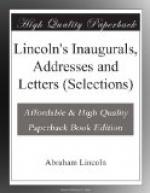for men expecting such a decision to keep the niche
in that law clear for it. After pointing this
out, I tell Judge Douglas that it looks to me as though
here was the reason why Chase’s amendment was
voted down. I tell him that as he did it, and
knows why he did it, if it was done for a reason different
from this, he knows what that reason was, and can
tell us what it was. I tell him, also, it
will be vastly more satisfactory to the country for
him to give some other plausible, intelligible reason
why it was voted down than to stand upon his dignity
and call people liars. Well, on Saturday he did
make his answer, and what do you think it was?
He says if I had only taken upon myself to tell the
whole truth about that amendment of Chase’s,
no explanation would have been necessary on his part—or
words to that effect. Now, I say here that I
am quite unconscious of having suppressed anything
material to the case, and I am very frank to admit
if there is any sound reason other than that which
appeared to me material, it is quite fair for him
to present it. What reason does he propose?
That when Chase came forward with his amendment expressly
authorizing the people to exclude slavery from the
limits of every Territory, General Cass proposed to
Chase, if he (Chase) would add to his amendment that
the people should have the power to introduce
or exclude, they would let it go. This is substantially
all of his reply. And because Chase would not
do that they voted his amendment down. Well,
it turns out, I believe, upon examination, that General
Cass took some part in the little running debate upon
that amendment, and then ran away and did not vote
on it at all. Is not that the fact?
So confident, as I think, was General Cass that there
was a snake somewhere about, he chose to run away
from the whole thing. This is an inference I
draw from the fact that, though he took part in the
debate, his name does not appear in the ayes and noes.
But does Judge Douglas’s reply amount to a
satisfactory answer? [Cries of “Yes,”
“Yes,” and “No,” “No.”]
There is some little difference of opinion here.
But I ask attention to a few more views bearing on
the question of whether it amounts to a satisfactory
answer. The men who were determined that that
amendment should not get into the bill, and spoil
the place where the Dred Scott decision was to come
in, sought an excuse to get rid of it somewhere.
One of these ways—one of these excuses—was
to ask Chase to add to his proposed amendment a provision
that the people might introduce slavery if they
wanted to. They very well knew Chase would do
no such thing—that Mr. Chase was one of
the men differing from them on the broad principle
of his insisting that freedom was better than
slavery—a man who would not consent to enact
a law, penned with his own hand, by which he was made
to recognize slavery on the one hand and liberty on
the other as precisely equal; and when they




